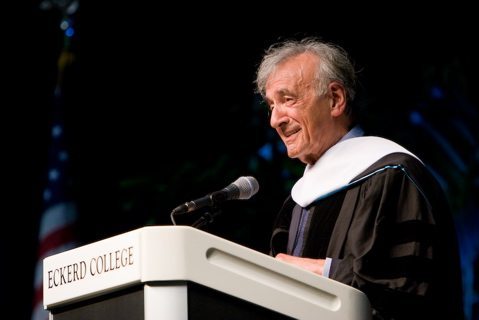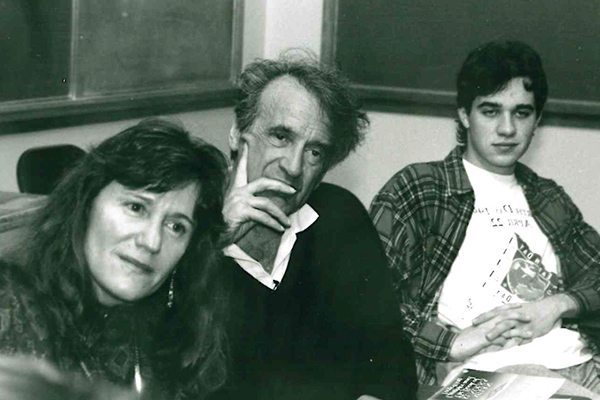Elie Wiesel told me that he believed every moment is a moment of grace.
Surely, every moment I spent with him was filled with grace, and every hour was an offering. We have been transformed by his life, writings and teaching. His stories are now our stories, and we are now witnesses. In 1993, I began a long and deeply meaningful friendship with Elie and Marion Wiesel. In that year, I taught a Winter Term course with Dr. Wiesel at Eckerd College. We would go on to teach 23 more courses together. We taught courses on madness, theodicy, mysticism, and the problem of evil and human suffering. And we taught courses on laughter, friendship and memory. He also lectured every year to our entire freshman class. “Think higher and feel more deeply,” he urged us. In all facets of Elie Wiesel’s life, he was a teacher. …
[His] teaching embodied the transformative power of love. He believed in love: love of sacred texts, or other human beings, of stories, of language and of silence. His smile could light a room. Because of his passage through the dark period of the Holocaust, many expected him to be sad all the time, but he had a marvelous sense of humor, and when he laughed, the universe smiled too. He said he didn’t think suffering conferred privileges but rather obligations, and he was able to transform his into lighting the way for others who had been abandoned. …

For Elie Wiesel, literature had a moral dimension, and by his example we were better people, having been in his humble, joyful, compassionate presence. He inspired us to examine our relationship to other people, to history and to God. In my years of teaching I saw his sense of wonder, his deep love of ancient texts and the power of silence as well as the power of words. Above it all he incarnated love. From the moment we began to teach together, I was keenly aware of the gift of every moment with him. Sometimes his stories or comments would bring us to tears, or laughter, or silence. Under the weight of his words, sometimes we could hardly breathe, because the air was so heavy when he spoke of his journey into darkness during the war. Once after teaching his magnificent book Night, I thanked him, and he said, “We owe it to the dead.”
—Carolyn Ross Johnston, Ph.D.
Elie Wiesel Professor of Humane Letters,
History and American Studies Professor, Eckerd College

Elie Wiesel with Carolyn Johnston in a classroom

